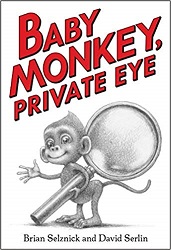story by Brian Selznick and David Serlin
pictures by Brian Selznick
Scholastic Press, 2018. 192 pages.
Starred Review
Review written March 5, 2018, from a library book.
2018 Sonderbooks Stand-out #2 in Picture Books – Silly Fun
Baby Monkey, Private Eye is the sort of book I hand to co-workers and insist that they read immediately. As The Invention of Hugo Cabret was something new in a children’s novel by telling much of the story with pictures, so Baby Monkey, Private Eye is something new in a book for beginning readers — by telling much of the story with pictures.
Now, I’m writing this before I’ve talked with anyone on the Newbery committee about the book, so this is only my opinion. So much of the brilliance of this book depends on the pictures, I doubt that it’s really a Newbery prospect. (Who knows, maybe I will be convinced later.) In fact, the pictures and text work so beautifully together, I’m already hoping this book will be next year’s Geisel Award winner – for books for beginning readers. That award can consider illustrations and text and how they work together to help kids read. [*Note added later*: I learned that alas, the Geisel Award has a page limit — so exactly what makes this book most distinguished — a long book beginning readers can read themselves — is the thing that makes it ineligible.]
If you wrote out the text of this book, I think it would be about the same as many other books for beginning readers. But Baby Monkey, Private Eye takes up far more pages with the same amount of text – spacing out the words, and providing more pictures.
Here’s the first chapter, coming after we’ve already met Baby Monkey, who is a baby and a monkey who has a job.
First, we see Baby Monkey sitting on the couch in his office, reading Famous Jewel Crimes. An opera singer bursts in.
Baby Monkey! Someone has stolen my jewels!
Baby Monkey can help!
Baby Monkey looks for clues.
Baby Monkey writes notes.
Baby Monkey eats a snack. [Mmm.]
Baby Monkey puts on his pants. [9 pages of pictures.]
Now Baby Monkey is ready!
[Aha!] Baby Monkey solves the case!
Zebra!
Hooray for Baby Monkey!
Every sentence above has its own 2-page spread, and some have extra pages of pictures in between.
This wouldn’t be extra-special if this relatively short chapter were just printed on a few pages. But it actually takes up 35 pages. And that’s where it’s brilliant.
See what I mean about the text not necessarily being distinguished all by itself? But when you put this with the pictures, including many things to find on repeated readings – the result is utter brilliance. Come on, this is one you’re going to have to check out and see for yourself!
By the way, this same format repeats in chapters two and three, so then we appreciate how it changes in chapters four and five when we are reminded that Baby Monkey is actually a baby.
Why has no one done this before? Why do people always stick to the standard beginning-reader format?
Well, no one else is Brian Selznick, illustrator extraordinaire, who routinely breaks out of standard formats.
The end result is that young beginning readers will get to read a big fat book! Oh, the sense of accomplishment when they finish reading all five chapters!
In even more fun, the authors have put an Index and Bibliography at the back. The Index has entries like “Carrots, baby (see also Snacks).” The Bibliography includes all the books Baby Monkey has been reading, and additional invented titles such as Predators Who Eat Pizza.
Baby Monkey is something very special. You don’t even have to have a beginning reader in the house to enjoy this book. But if you do, go out and buy a copy today!
Find this review on Sonderbooks at: www.sonderbooks.com/Picture_Books/baby_monkey.html
Disclosure: I am an Amazon Affiliate, and will earn a small percentage if you order a book on Amazon after clicking through from my site.
Disclaimer: I am a professional librarian, but I maintain my website and blogs on my own time. The views expressed are solely my own, and in no way represent the official views of my employer or of any committee or group of which I am part.
What did you think of this book?
